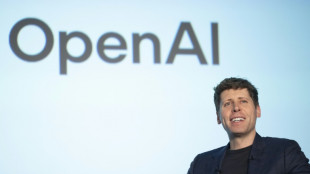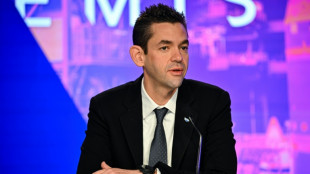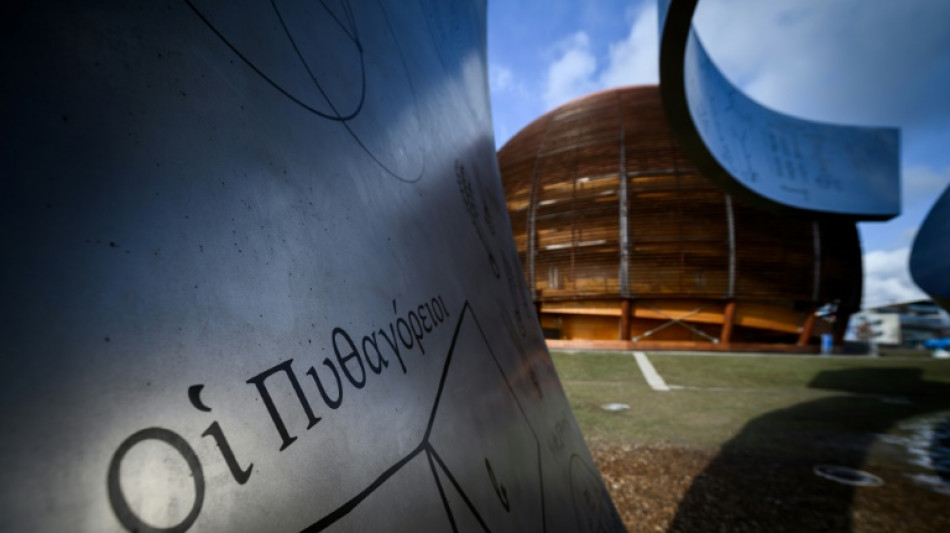
-
 'Superman Sanju' toast of India after T20 World Cup heroics
'Superman Sanju' toast of India after T20 World Cup heroics
-
Travel chaos, but F1 season-opener in Australia 'ready to go'

-
 Lunar New Year heartache for Chinese team at Women's Asian Cup
Lunar New Year heartache for Chinese team at Women's Asian Cup
-
El Nino may return in 2026 and make planet even hotter

-
 Somaliland's Israel deal could put Berbera port at risk
Somaliland's Israel deal could put Berbera port at risk
-
Texas primaries launch midterm battle with Trump agenda at stake

-
 How a Syrian refugee chef met Britain's King Charles
How a Syrian refugee chef met Britain's King Charles
-
Bangladesh tackle gender barriers to reach Women's Asian Cup

-
 Argentina's Milei says wants US 'strategic alliance' to be state policy
Argentina's Milei says wants US 'strategic alliance' to be state policy
-
'Sinners' wins top prize at Screen Actors Guild awards

-
 New rules, same old suspects as F1 revs up for 2026 season
New rules, same old suspects as F1 revs up for 2026 season
-
World Cup tickets: Huge demand and sky-high prices

-
 List of key Actor Award winners
List of key Actor Award winners
-
Trump hunkers down after Iran strikes

-
 China's leaders gather for key strategy session as challenges grow
China's leaders gather for key strategy session as challenges grow
-
UK toughens asylum rules to discourage migration

-
 Israel hits Lebanon after Hezbollah fire, expanding Iran war
Israel hits Lebanon after Hezbollah fire, expanding Iran war
-
CBS in turmoil as US media feels pressure under Trump

-
 Messi bags double as Miami battle back to down Orlando
Messi bags double as Miami battle back to down Orlando
-
Greenland is 'open for business' -- kind of, says business leader

-
 Canada's Carney to mend rift, boost trade as he meets India's Modi
Canada's Carney to mend rift, boost trade as he meets India's Modi
-
Crude soars, stocks drop after US strikes on Iran

-
 Iran war spreads across region as US, Israel suffer losses
Iran war spreads across region as US, Israel suffer losses
-
Miriam Margolyes tackles aging in Oscar-nominated short

-
 Recognition, not competition, for Oscar-nominated foreign filmmakers
Recognition, not competition, for Oscar-nominated foreign filmmakers
-
Israel, Hezbollah trade fire: latest developments in Iran war

-
 Israel strikes Tehran: latest developments in Iran war
Israel strikes Tehran: latest developments in Iran war
-
Trump vows to avenge first US deaths as Iran war intensifies

-
 Lowry collapses late again, Echavarria snatches victory in Cognizant Classic
Lowry collapses late again, Echavarria snatches victory in Cognizant Classic
-
Aubameyang strikes twice as Marseille edge Lyon in Ligue 1

-
 Infantino says players who cover mouths when speaking could be sent off
Infantino says players who cover mouths when speaking could be sent off
-
Bolsonaro son rallies the right as thousands protest Brazil government

-
 Juve stay in Champions League hunt with last-gasp Roma draw
Juve stay in Champions League hunt with last-gasp Roma draw
-
Maersk suspends vessel transit through Strait of Hormuz

-
 France, Germany, UK ready to take 'defensive action' against Iran
France, Germany, UK ready to take 'defensive action' against Iran
-
Knicks halt Spurs' 11-game NBA winning streak

-
 EU warns against long war, urges 'credible transition' in Iran
EU warns against long war, urges 'credible transition' in Iran
-
Bored of peace? Trump keeps choosing war

-
 Arteta embraces Arsenal's 'Set-Piece FC' label after corners sink Chelsea
Arteta embraces Arsenal's 'Set-Piece FC' label after corners sink Chelsea
-
Sevilla rescue derby draw to deal Betis top four setback

-
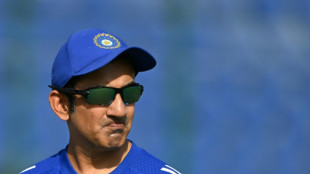 India need 'special effort' to beat England in semi-final: Gambhir
India need 'special effort' to beat England in semi-final: Gambhir
-
'A terrible day,' says Israel community shaken by deadly Iranian strike

-
 Arsenal corner Chelsea into submission, Man Utd climb to third
Arsenal corner Chelsea into submission, Man Utd climb to third
-
Arsenal win set-piece battle to sink Chelsea in title boost

-
 What future for Iranian leadership after Khamenei's death?
What future for Iranian leadership after Khamenei's death?
-
'Scream 7' makes a killing at N. America box office
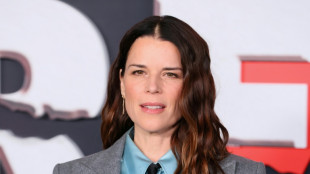
-
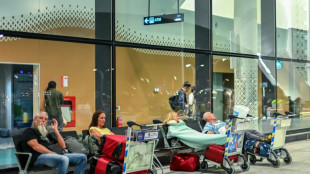 Thousands stranded as Iran conflict shuts Mideast hubs
Thousands stranded as Iran conflict shuts Mideast hubs
-
Samson's 97 puts India into T20 World Cup semi-final against England
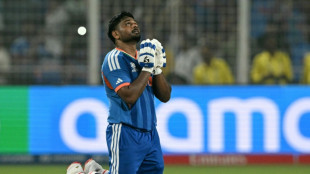
-
 Latest developments as Iran retaliates to US-Israel strikes that killed Khamenei
Latest developments as Iran retaliates to US-Israel strikes that killed Khamenei
-
Spurs have 'big problems' says Tudor as relegation risk persists


No technical obstacles to new giant particle collider in Europe: CERN
Europe's CERN laboratory said on Monday that a detailed analysis revealed no technical obstacles to building the world's biggest particle collider, even as critics took issue with the "pharaonic" $17-billion project.
The Future Circular Collider (FCC) project is essential for ensuring that Europe maintains its global leadership in fundamental physics, CERN chief Fabiola Gianotti told AFP.
"There is real competition" from China in particular, she cautioned, hailing that the giant FCC "project is absolutely on the good track" and urging states to release the funding needed to move forward.
After analysing around 100 different scenarios, CERN on Monday published the results of a years-long feasibility study for its preferred option: a nearly 91-kilometre (56-mile) circular tunnel straddling the French-Swiss border.
With an average depth of 200 metres (660 feet), the tunnel would accommodate a particle accelerator that would be more than three times the length of CERN's existing Large Hadron Collider, currently the largest of its kind.
The LHC -- a 27-kilometre proton-smashing ring running about 100 metres below ground -- has among other things been used to prove the existence of the Higgs boson.
Dubbed the God particle, the Nobel Prize-winning discovery broadened science's understanding of how particles acquire mass.
- 'Rich in possibilities' -
With LHC expected to have fully run its course by 2041, CERN has been analysing options to allow scientists to keep pushing the envelope.
Gianotti hailed the success of the feasibility study, stressing that "we have found no technical showstopper so far".
Others were similarly enthusiastic about the FCC.
"To make major progress in its quest to understand the origin of the universe and the role the Higgs boson plays... the global scientific community needs a machine as powerful and rich in possibilities as the FCC," Catherine Biscarat of the L2IT lab at Toulouse University told AFP.
But not everyone is thrilled with the idea of the giant project, which has been estimated to cost 15 billion Swiss francs ($16.9 billion).
CERN's member states -- 23 European countries and Israel -- need to decide by 2028 whether to release the funds needed.
But Germany, CERN's largest contributor, last year voiced reservations about the towering sums required.
CERN spokesman Arnaud Marsollier tried to allay those concerns, insisting that up to 80 percent of the FCC's cost "could be covered by the organisation's budget".
- 'Like David and Goliath' -
Some locals are meanwhile up in arms about the project and the impact it could have on their lives and livelihoods.
Thierry Perrillat, a dairy farmer in Roche-sure-Foron in France, maintained that the planned collider would swallow "five hectares of our farm".
"It's like David and Goliath," he said bitterly.
The project has also sparked disagreement among scientists.
"The financial, ecological, and operating costs are astronomical," physicist Olivier Cepas of the Neel Institute at the University of Grenoble told AFP.
"It would be better to fund smaller scientific projects," he insisted.
FCC project engineer Jean-Paul Burnet meanwhile insisted that the FCC plans had been "improved to reduce its environmental impact", by for instance lowering the number of wells and surface sites.
But environmental groups in the region were not convinced.
In a report, the environmental association Noe21 slammed the "excessive" FCC project, pointing to its "astronomical electricity consumption", its climate impact, its cost and scale.
- 'Stunned' -
Franco-Swiss collective CO-CERNes, which includes the WWF and Greenpeace, has been organising information sessions in nearby communities.
At a recent such session in Marcellaz, located near one of the eight planned FCC surface sites, organiser Thierry Lemmel told AFP the group was providing information about this "pharaonic project".
"Progress is necessary," he said.
But, he asked, given the state of the planet today, "should we really be mobilising so many resources, so much wealth ... for this project, with uncertain results?".
Among the around 100 people who attended the Marcellaz meeting was Kevin Mugnier, who had only just heard of the FCC project.
"I was a bit stunned," he said, worried his land might be requisitioned.
In Ferney-Voltaire, at one of the seven surface sites planned on the French side, mayor Daniel Raphoz said he favoured the "win-win" project, which he maintained would have positive effects on employment and energy.
"CERN's overflow energy will be used to heat the town," he said.
If the FCC is not built here, progress would move elsewhere, he warned.
"It will be happening in China, (marking) European decline."
apo-burs/nl/sbk
A.Jones--AMWN

